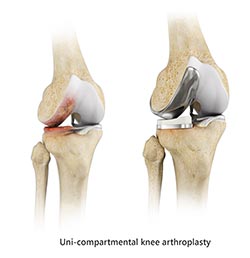
The knee is a complex joint which consists of bone, cartilage, ligaments, and tendons that make joint movements easy and at the same time it is more susceptible to various kinds of injuries. Knee problems may arise if any of these structures get injured by overuse or suddenly during sports activities. Injuries to the knee can be caused by degenerative diseases such as arthritis, traumatic injuries, and sports injuries. These conditions may affect the bones & joints and impair the mobility as well as the quality of life of the patients. All these conditions require appropriate treatment, may be surgical or non-surgical to restore to normal activities. The non-operative orthopaedic treatment options include non-pharmacological and pharmacological interventions. They are aimed at providing symptomatic relief and improving the quality of life of the patients. They can be used as a treatment option to treat certain conditions or to decrease pain as well as promoting functioning and quality of life after the surgical treatment.
Non- pharmacological intervention
Non-pharmacological interventions may range from simple lifestyle modification or physical exercises and rehabilitation programs. Some of the non-pharmacological interventions include:
Weight reduction and physical exercise - The lifestyle changes resulting in weight loss in obese individuals and doing appropriate physical exercises plays an important role in the prevention and management of the knee conditions. The optimal weight (BMI) should be 18.5 to 25. BMI of 25-29 is considered overweight and BMI over 30 is considered as obese.
Thermotherapy
Thermotherapy involves the application of hot or cold packs at the affected area. There is some evidence to support the use of cold therapy in providing symptomatic relief. Heat may make the joint feel more limber, however it may promote inflammation if not used in conjunction with cold therapy.
Physical therapy
Supervised physiotherapy attempts to strengthen to muscle around the knee to help the knee function more appropriately even in the setting of your arthritis. Additionally, therapist seek to help you regain motion if your knee is stiffened. Instructions of proper gait and activity modificaitons can be helpful in alleviating pain associated with your knee arthritis.
Pharmacological interventions
Pharmacological interventions include management of pain using anti-inflammatories (NSAIDs) or injections. Acetaminophen can also be utilized to alleviate pain.
Non-steroidal anti-inflammatory drugs
These are known as NSAIDs and are found to be effective in reducing pain and inflammation of the knee. Patients with a history of heart disease, diabetes, kidney disease, or who are on blood thinners should avoid the use of NSAIDS.
Steroid injections
These injections of steroids are given directly into the affected joint for severe pain when the use of NSAIDs does not bring much relief. Steroids are very strong anti-inflammatory drugs and if used orally cause various side effects on other body systems. Localized affect of steroids in the joint can limit some of these side-effects.
Hyaluronic (Gel) injections
Hyaluronic acid is a naturally occurring substance in the joints that provides lubrication and acts as a shock absorber. With arthritis, this substance is largely deficient, leading to worsening of the condition. Hyaluronic acid injections into the knee can help reduce pain and improve range of motion.
Platelet-rich plasma or PRP is obtained from your blood and may be used in an intra-articular injection of the knee joint to encourage tissue regeneration, reduce pain and improve function.
Discuss with your physician about these therapeutic options before initiating the treatment.






